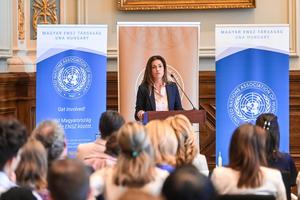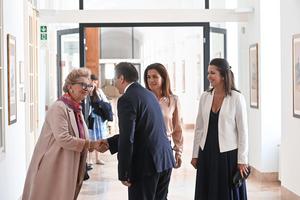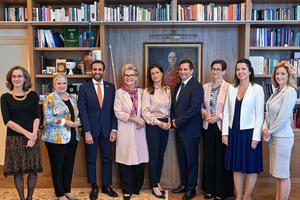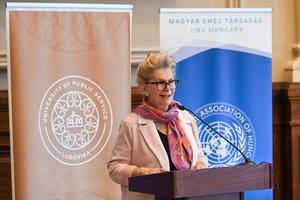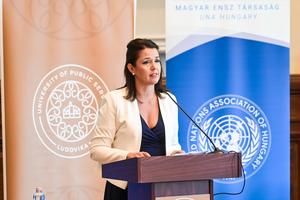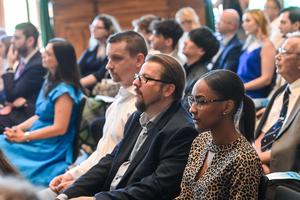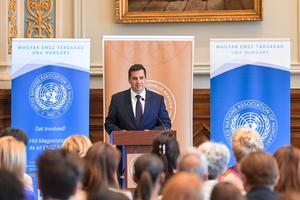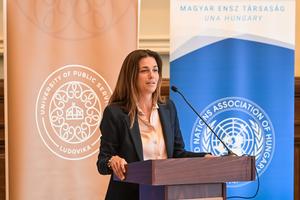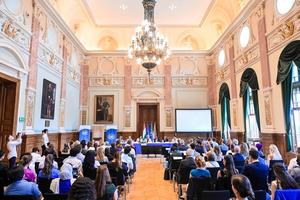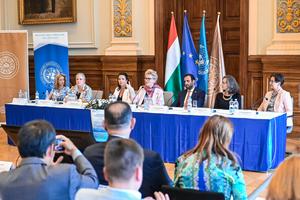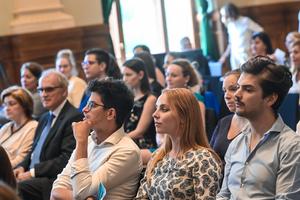The international exchange of views on the World Day of Women Diplomats, launched by the United Nations last year, took place as a special event of the Ludovika Ambassadors' Forum in the Széchenyi Hall of the University of Public Service on 29 June 2023.
Boglárka Koller, Vice-Rector for International Affairs of the University, opened the event. In her speech, she underlined that throughout history, women have demonstrated exceptional diplomatic skills, acted as catalysts for change and helped to create a more inclusive and peaceful world. "Despite all these efforts, we women still face enormous obstacles. We need to align more roles to succeed," she said. The conference aims to highlight the importance of women's role in diplomacy and provide a platform for dialogue on issues such as gender equality, women's rights, peace-building and sustainable development.
Katalin Bogyay, Ambassador, diplomat and President of the Hungarian UN Society, began her speech by mentioning the women who have paved the way in the previously male-dominated world of diplomacy. Referring to a painting depicting the 1898 Berlin Congress, she pointed out that there were no women in the painting, listing the statesmen in the picture, including Gyula Andrássy. "We have come a long way", she said. Meanwhile, she added, women have long played an important role in diplomacy: the world's first female ambassador, Rózsa Bédy-Schwimmer, for example, was Hungarian, but she was only allowed to work at the Swiss embassy for a short time because she was not accepted.
Last year, the UN General Assembly decided to designate 24 June as World Day of Women Diplomats, and Ambassador Katalin Bogyay was delighted to be part of the celebrations.
Gergely Deli, Rector of UPS, also welcomed the guests. "We believe that effective diplomacy based on sound knowledge is essential for achieving lasting peace, prosperity and sustainable development". He said the World Day was a huge step towards gender equality and inclusion. The aim of this exchange is to "engage in meaningful discussions, promote international cooperation and pave the way for a better future. Speeches and presentations will focus on the role of women in conflict resolution, peacebuilding and combating stereotypes," said Gergely Deli.
Judit Varga, Minister of Justice, started her keynote speech with the idea that this issue cannot be approached from a political and scientific point of view only, as there is no one-size-fits-all solution for women's roles, and therefore personal elements are crucial. On the role of women in diplomacy, she said that it was very important to have women in diplomacy, and it was good that there were more and more of them. However, the minister did not enter the world of international diplomacy - and now, as an outgoing minister, she is returning to it - because she planned to do so, but because she had something to say to her partners and, as she said, she happened to do so as a woman.
But if the question is whether the fact that she is a woman has played a role in the pace of her career, the answer is yes. Because a woman has to consider her biological endowments and, thus, her dreams and plans for starting a family. Men and women have natural talents, abilities, and emotional and physical characteristics. "In accordance with the Hungarian constitution, I can say that we cannot question the rules and laws of biology and nature, so the mother is a woman who is born a woman, and the father is a man who is born a man," she said.
The minister cited several examples from the history of women's empowerment and then noted the COVID era, when women politicians had important insights, helped by their maternal experiences, on how to adapt to the new situation. Women's differing ways of communication compared to men were also discussed: in many cases, women ask questions courageously, without shying away from appearing naïve - all in the interests of a better outcome and community.
What can the government do to support women? There is no single recipe. It is, therefore, important to ensure that everyone can live the life they want. This requires flexible laws and rules," said Judit Varga, who concluded her speech by stressing the importance of establishing peace as soon as possible.
Ecuadorian Maria Fernanda Espinosa, President of the 73rd session of the UN General Assembly, shared her thoughts in a video message. "Diplomacy - the art of agreement and dialogue - has always been an indispensable tool for peace-building, conflict resolution, the promotion of sustainable development and the promotion of cooperation among nations. Throughout history, women have always played an important role in this, albeit often under-represented," she said. Many women diplomats have contributed to making women's voices heard in international organisations, challenging many stereotypes. Citing a report by Global Women Leader's Voices, Maria Fernanda Espinosa pointed out that 33 multilateral international organisations had been studied since 1945 to see how the number of women leaders had evolved. Of 382 leaders, only 47 were women, and even today, only one-third of these organisations have a woman leader. "Let's break down the barriers to women's empowerment by providing an environment that supports them and also helps the next generation of female diplomats through networking and knowledge sharing," she suggested.
Panel discussions followed the presentations, with Ambassadors Susan Kleebank of Brazil, Caroline Charette of Canada, Saud Alshamsi of the United Arab Emirates, Orsolya Ferencz, Ministerial Commissioner for Space and Klára Breuer, Ambassador of Hungary to Finland. Susan Kleebank spoke about the relevant Brazilian legislation and also about diplomat Bertha Lutz, one of the four women who signed the UN Charter. Caroline Charette spoke of the importance of the needs and attitudes of Canadian society and how this has been supported by legislation - and today, Canada has more female ambassadors than male. As the only male participant, Saud Alshamsi said: "You serve your country well when you seek to give women and men equal power and rights.
Based on her personal memories, Klára Breuer recalled the long journey, as a result of which there are considerably more women working in Hungarian diplomacy today than in the years following the fall of communism when she hardly met any women in the world of foreign affairs as a young professional. She advised young women to be aware of and take advantage of the opportunities offered by their professional path.
Orsolya Ferencz pointed out that although women are still present in universities, even in what used to be considered more masculine disciplines, they "disappear" later. The academic world needs them, and society should not lose them, so stereotypes must be combated. “On the ISS, too, we are lucky if there are half as many women as men because there are complex problems to be solved," she said, referring to the International Space Station's specialists. Society as a whole needs a male and female approach. Her message to women: yes, you can. And to men, she asks them to support women in becoming more confident.
Boglárka Koller presented the data of the Equal Opportunities Index, which ranks Hungary 25th out of the 27 EU member states - which is not good, but a few years ago, we were still in the lead. In some respects, the situation in Hungary is good - for example, the proportion of women in higher education - but there are still very few women in parliament. We also cannot be satisfied with the number of women in academia.
Overall, the panellists agreed that women and men think differently and can be more successful together.
Text: Lilla Kovács
Photo: Dénes Szilágyi
